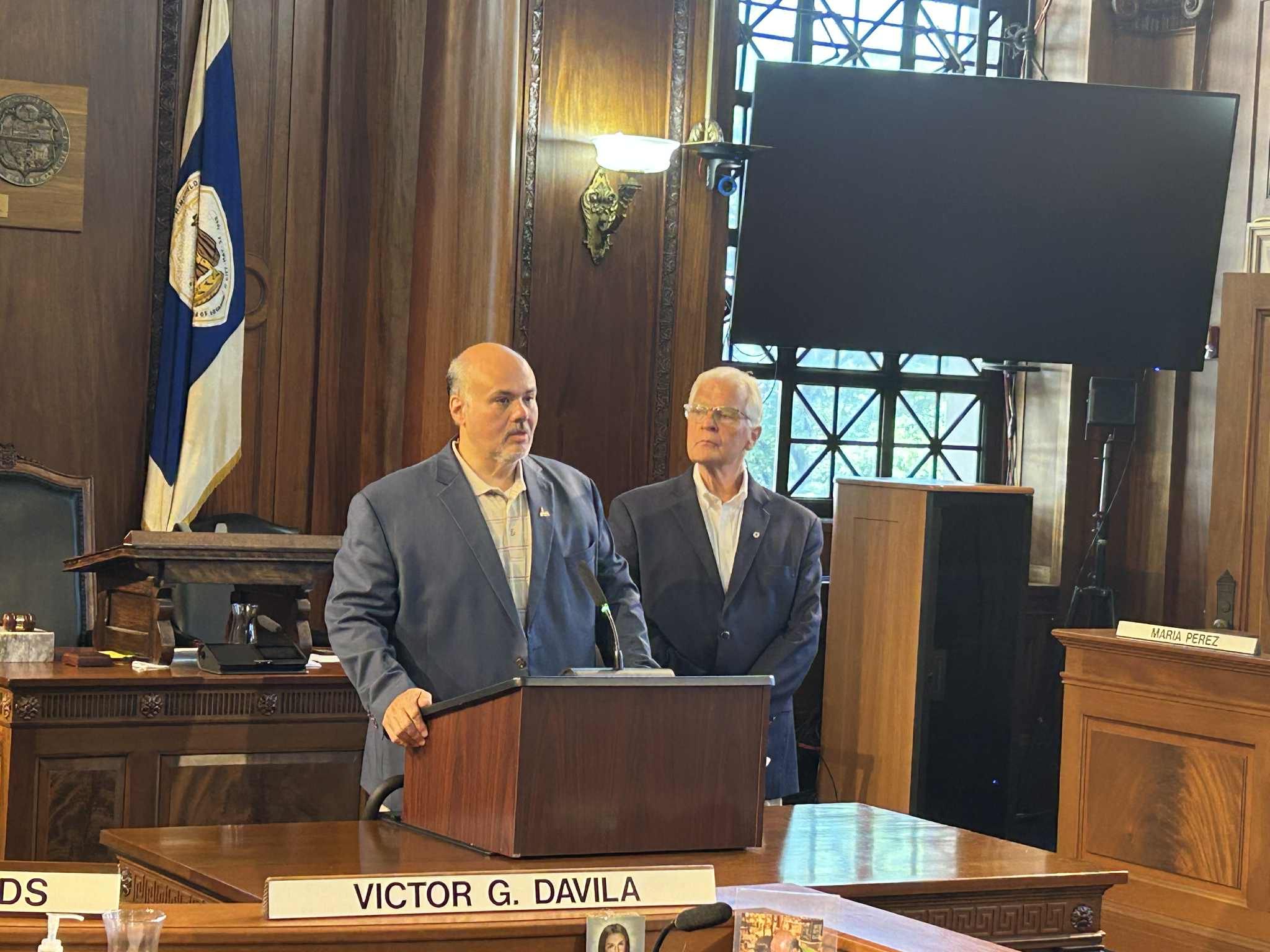At-Large City Councilor Brian Santaniello and Ward 6 City Councilor Victor Davila proposed a new ordinance inside City Hall that aims to solve the issue of unpaid ordinance tickets across the city.
Reminder Publishing photo by Ryan Feyre
SPRINGFIELD — Two city councilors aim to solve the issue of unpaid ordinance tickets in Springfield with a new law that they hope to present to the full council in September.
At a press conference on Aug. 8, At-Large City Councilor Brian Santaniello and Ward 6 City Councilor Victor Davila introduced the “Springfield Fair Enforcement and Public Accountability Ordinance” to simultaneously improve quality of life and ensure the city is not leaving revenue on the table.
“We have anywhere from $1 to $3 million in unpaid ordinance tickets across the city,” Davila said. “In a time where the city needs revenue, that is completely unacceptable.”
According to Santaniello, the new ordinance does not aim to punish people, but it does hold chronic offenders accountable for their inability to pay tickets for ordinance violations.
In an interview, Davila said an ordinance violation can range from open container infractions, parking tickets, trash violations, infringements stemming from noise complaints and more.
If the new ordinance passes the full council, it will address the unpaid ordinance tickets issue through a balance of “enforcement and compassion,” according to Santaniello and Davila.
The proposed ordinance states that a property owner will receive a notice with no late fee after the first ordinance violation. After 30 days of no payment, the owner must pay a $10 monthly payment, which increases to $25 a month after 90 days of no payment. If the owner still has not paid their ordinance ticket after six months, a lien may be placed on the property — but only after multiple notices and opportunities to resolve the matter have not been taken care of.
Santaniello and Davila’s ordinance proposal also features a three strikes rule for those who have received three unpaid ordinance violations.
“We support publicly publishing the names of violators — but only after three unpaid ordinance violations,” the ordinance language reads. “This ‘three strikes’ rule distinguishes between the occasional mistake and a chronic offender. Once you’ve failed to pay three separate tickets — despite repeated notice and opportunity to resolve — you forfeit anonymity. That’s fair warning, not public shaming.”
For low-income residents and seniors who carry financial struggles, the ordinance would produce a Springfield Ordinance Assistance Program to help those residents “meet their obligations without fear of losing their homes.” The proposed law states that residents may qualify for payment plans or partial waivers depending on income verification.
The councilors say this program ensures “equity in enforcement.”
“We are not looking to punish anyone with this ordinance; however, we are not looking to reward anyone either,” Santaniello said. “This is a quality of life issue for the law abiding citizens of our great city.”
At the press conference, Santaniello said the ordinance’s creation stems from work done by Ward 7 City Councilor Tim Allen and current City Council candidate Gerry Martin. Aside from working with the law department, the duo has also looked at ways to solve the issue of the Dollar Tree off Allen Street and Island Pond Road, which, according to councilors, owes thousands of dollars in unpaid tickets.
“I don’t like to get poked in the eye,” Santaniello said. “And that’s exactly what [the Dollar Tree] is doing to each and every one of these councilors.”
Allen said the council’s general Government Subcommittee was scheduled to meet with the Dollar Tree’s regional manner to discuss the store’s unpaid ordinance issues that have been going on for a decade on Aug. 14.
According to Martin, the store has had five unpaid tickets since 2023, amounting to approximately $1,050.
“I’ve been working on the Dollar Tree thing for 10 years,” Allen said at the press conference. “It’s been a frustrating thing to work on, but we finally made some progress in the last week.”
Part of the reason for the exorbitant amount of unpaid ordinance tickets is because the city’s prior software forced departments to work in silos, which, according to Davila, caused some miscommunication and disorganization.
However, the city implemented a new program called Open.gov, which went into effect July 1. Davila said the new service allows the departments to be on the same page when an unpaid ordinance ticket comes through. The council’s General Government subcommittee is hosting a meeting on Aug. 18 to review the program’s first 30 days in action.
Working in conjunction with Open.gov is Santaniello and Davila’s proposed ordinance, which would require quarterly reports to the City Council on ticket enforcement, including how many were issued, how many remain unpaid, how many entered assistance programs and how many reached the third-strike threshold.
Davila said the ordinance will go in front of the full council for first reading at its September regular meeting.



